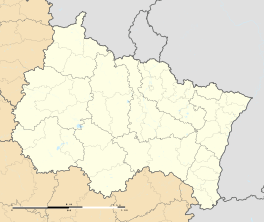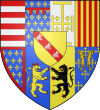Saint-Avold
| Saint-Avold | ||
|---|---|---|
|
Eastern end of Abbey of Saint-Nabor | ||
| ||
 Saint-Avold | ||
|
Location within Grand Est region  Saint-Avold | ||
| Coordinates: 49°06′37″N 6°42′38″E / 49.1102°N 6.7106°ECoordinates: 49°06′37″N 6°42′38″E / 49.1102°N 6.7106°E | ||
| Country | France | |
| Region | Grand Est | |
| Department | Moselle | |
| Arrondissement | Forbach-Boulay-Moselle | |
| Canton | Saint-Avold | |
| Intercommunality | Pays naborien | |
| Government | ||
| • Mayor (2008–2014) | André Wojciechowski (PR) | |
| Area1 | 35.48 km2 (13.70 sq mi) | |
| Population (2006)2 | 17,406 | |
| • Density | 490/km2 (1,300/sq mi) | |
| Time zone | CET (UTC+1) | |
| • Summer (DST) | CEST (UTC+2) | |
| INSEE/Postal code | 57606 / 57500 | |
| Elevation | 215–383 m (705–1,257 ft) | |
|
1 French Land Register data, which excludes lakes, ponds, glaciers > 1 km² (0.386 sq mi or 247 acres) and river estuaries. 2 Population without double counting: residents of multiple communes (e.g., students and military personnel) only counted once. | ||
Saint-Avold (German: Sankt Avold) is a commune in the Moselle department in Grand Est in north-eastern France.
It is situated twenty-eight miles (45 km) east of Metz, France and seventeen miles (27 km) southwest of Saarbrücken, Germany.
History
The Saint-Avold area has frequently suffered invasions and since the nineteenth century has been controlled alternately by German and French authorities.
The original Abbey of Saint Nabor began as an oratory for a sixth-century monastery. Gradually a complex developed after it received the relics of Saint Nabor, and the church was rebuilt in the eighteenth century, in part following baroque style. It was designated as a basilica.
During the French Revolution, the monastery and church suffered extensive damage; the cloisters were destroyed. The ancient parish church was sacrificed in exchange for keeping Saint Nabor. The abbey also suffered bombing damage during World War II, but much of the church has been restored.
Lorraine American Cemetery

Just north of the town is the site of Europe's largest United States' World War II military cemetery, the Lorraine American Cemetery and Memorial, with the graves of 10,489 American soldiers who died during World War II. Most of the men were killed during the United States' drive to expel German forces from the fortress city of Metz toward the Siegfried Line and the Rhine River. The soldiers were mostly from the U.S. Seventh Army's Infantry and Armored divisions and its cavalry groups.[1]
Climate
Climate in this area has mild differences between highs and lows, and there is adequate rainfall year round. The Köppen Climate Classification subtype for this climate is "Cfb" (Marine West Coast Climate/Oceanic climate).[2]
| Climate data for Saint-Avold | |||||||||||||
|---|---|---|---|---|---|---|---|---|---|---|---|---|---|
| Month | Jan | Feb | Mar | Apr | May | Jun | Jul | Aug | Sep | Oct | Nov | Dec | Year |
| Average high °C (°F) | 4 (39) |
6 (42) |
11 (52) |
15 (59) |
19 (67) |
22 (72) |
24 (76) |
24 (75) |
21 (69) |
15 (59) |
9 (48) |
4 (40) |
14 (58) |
| Average low °C (°F) | −2 (29) |
−2 (29) |
1 (34) |
4 (40) |
8 (46) |
11 (52) |
13 (55) |
13 (55) |
10 (50) |
6 (42) |
2 (36) |
−1 (31) |
6 (42) |
| Average precipitation cm (inches) | 5 (2) |
4.1 (1.6) |
4.8 (1.9) |
4.6 (1.8) |
5 (2) |
5.8 (2.3) |
6.9 (2.7) |
6.4 (2.5) |
5.6 (2.2) |
6.6 (2.6) |
6.1 (2.4) |
6.4 (2.5) |
67.1 (26.4) |
| Source: Weatherbase [3] | |||||||||||||
Sister cities
|
See also
References
- ↑ "Lorraine American Cemetery and Memorial", American Battle Monument Commission
- ↑ Climate Summary for Saint-Avold, France
- ↑ "Weatherbase.com". Weatherbase. 2013. Retrieved on July 6, 2013.
External links
- History of Saint Avold
- Saint-Avold, France Web site
- Photo of Saint Nabor Basilica
- Sociéte d'Histoire du Pays Naborien

